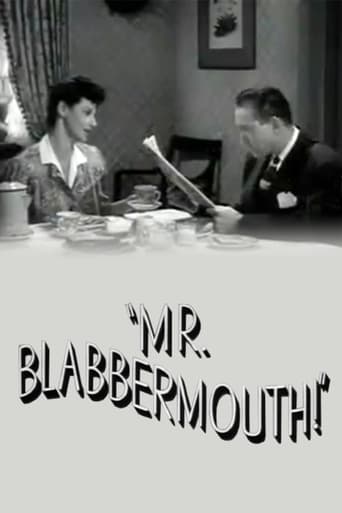bkoganbing
This wartime short subject from MGM early in America's participation in World War II instructs us not to listen to the doubters and naysayers among us. The film grew out of an editorial by Manchester Boddy from the Los Angeles Times who was also the person responsible for the idea that was later filmed by MGM in Malaya.Mr. Blabbermouth is constantly saying that we peace loving folks can't defeat a martial people with a ruthless war spirit instilled by a dictator who wants to conquer. We also are lacking in the many resources needed to win the war.The film is a lesson in geopolitics if nothing else and makes certain assumptions that the forces that are allied with America to defeat the Axis will always be with us and the natural resources they bring to the table. When narrator John Nesbitt starts talking about these, think of today's world situation.Which makes the film incredibly dated, but still an interesting piece of history.
Neil Doyle
This short subject is typical of the wartime propaganda films warning us against believing all the false rumors spread by the Mr. Blabbermouths in society who want to impress others with their know-it-all attitudes in spreading misinformation.Since we all know people like Mr. Blabbermouth, it's easy to accept the idea that common sense must prevail against this sort of thing if we're to be good citizens. World War II was rife with sayings like: "Loose lips sink ships." Taking a stance against the Mr. Blabbermouths of the world was commonly accepted as the right thing to do.Based on an editorial that appeared in The Los Angeles Daily News, it begins with a blackout during an air raid alarm and shows how the gossipers talked about it the next day, with some of them spreading false rumors implying that the Japanese were better equipped for war since they'd been training for it for years. We then see some amusing sequences of Mr. Blabbermouth spreading his own lies and finally getting his comeuppance from the neighborhood barber who knows how to shut him up.Along the way, the narrator points out how much better equipped the United States was than Japan in terms of military preparations to fight back against the attack with a wealth of aluminum and steel.Amusing and timely, it's done with a sense of humor but teaches a good lesson.
elyrest
At first glance this seems to be a stereotypical patriotic U.S. WWII film. It is much more than that even when you factor in some of the cringing portrayals of the enemy. If the enemy were as idiotic as they are often portrayed why were they such a problem? This film balances the jingoistic part with a very good message about attitude. Mr. and Mrs. Blabbermouth are the people who always make the worst of a good situation. If there is any good to be found they will bury it. This film tries to give the American public a feel good boost about their situation in the war. It's a morale builder and it works. I know that I would have felt more optimistic after seeing this short in 1942.
Ron Oliver
An MGM Short Subject.Who's that boorish fellow, with his constant negative talk about our Allies and the War effort? Why, it's MR. BLABBERMOUTH!This little film uses a humorous approach to illustrate a problem nagging the country. It is not, as the title might suggest, a `Loose Lips Sink Ships' lecture, but rather how to deal with those Americans who constantly brought down the morale of others by their pessimistic attitudes about our fight against the Axis. It is just as pertinent now as it was then.After Pearl Harbor, Hollywood went to war totally against the Axis. Not only did many of the stars join up or do home front service, but the output of the Studios was largely turned to the war effort. The newsreels, of course, brought the latest war news into the neighborhood theater every week. The features showcased battle stories or war related themes. Even the short subjects & cartoons were used as a quick means of spreading Allied propaganda, the boosting of morale or information dissemination. Together, Uncle Sam, the American People & Hollywood proved to be an unbeatable combination.


 AD
AD


